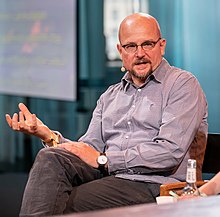German system biologist (born 1969)
| Dirk Brockmann | |
|---|---|
 Brockmann at re:publica in 2022 Brockmann at re:publica in 2022 | |
| Born | (1969-09-02) September 2, 1969 (age 55) Braunschweig, Germany |
| Education | Duke University University of Göttingen Max Planck Institute for Dynamics and Self-Organization |
| Scientific career | |
| Institutions | Northwestern University Humboldt University of Berlin Robert Koch Institute Technische Universität Dresden |
| Doctoral advisor | Theo Geisel |
| Website | synosys |
Dirk Brockmann (born September 2, 1969) is a German physicist and Professor in Biology of Complex Systems and the founding director of the Center Synergy of Systems at Technische Universität Dresden. Brockmann is known for his work in complex systems, complex networks, computational epidemiology, human mobility and anomalous diffusion.
Education and career
Brockmann was born in Braunschweig and studied physics and mathematics at Duke University and the University of Göttingen where he received his degree in theoretical physics in 1995 and his PhD in 2003 under the supervision of Theo Geisel. After postdoctoral positions at the Max Planck Institute for Dynamics and Self-Organization, Göttingen he became associate professor in the Department of Engineering Sciences and Applied Mathematics at Northwestern University in 2008.
In 2013 he returned to Germany, where he became professor at the Institute for Biology at Humboldt University of Berlin with a project group at the . During COVID-19 Brockmann initiated and led multiple big data projects to mitigate the pandemic as the mobility monitor, contact monitor and the Corona Data Donation Project.
Since October 2023, he is Professor in Biology of Complex Systems at Technische Universität Dresden and the founding director of the Center Synergy of Systems (SynoSys), which promotes complexity research with a trans-/anti-disciplinary approach.
Brockmann worked on a variety of topics ranging from computational neuroscience, anomalous diffusion, Levy flights, human mobility, computational epidemiology, and complex networks.
Research
Brockmann pioneered the scientific use of mass data collected in online games in a 2006 study in which he and his colleagues analyzed the geographic circulation of millions of dollar-bills registered at the online bill tracking website Where's George? This study lead to the discovery of universal scaling laws in human mobility, the forecast of spreading routes of the 2009 flu pandemic in the United States and effective geographic borders in the United States. Brockmann also pioneered the development of computational models and forecast systems for the global spread of epidemics based on global air-transportation. In a 2013 study Brockmann and his colleague Dirk Helbing showed that complex global contagion phenomena can be mapped onto simple propagating wave patterns using the theoretical concept of effective distance. This method was employed for import risk estimates during the Ebola virus epidemic in West Africa in 2014.
Brockmann's research has been featured in an episode of the American crime drama television series Numbers.
Since 2017 he has been publishing "Complexity Explorables", which are interactive D3 animations of complex systems.
References
- Center Synergy of Systems, official website of The Center Synergy of Systems, 7 October 2024
- German mobility monitor, official project website, 7 October 2024
- German contact monitor, official project website, 7 October 2024
- Corona Data Donation Project, official project website, 7 October 2024
- Brockmann, D.; Geisel, T. (28 April 2003). "Lévy Flights in Inhomogeneous Media". Physical Review Letters. 90 (17): 170601. arXiv:cond-mat/0211111. Bibcode:2003PhRvL..90q0601B. doi:10.1103/physrevlett.90.170601. ISSN 0031-9007. PMID 12786061. S2CID 3010225.
- Hufnagel, L.; Brockmann, D.; Geisel, T. (11 October 2004). "Forecast and control of epidemics in a globalized world". Proceedings of the National Academy of Sciences. 101 (42): 15124–15129. arXiv:cond-mat/0410766. Bibcode:2004PNAS..10115124H. doi:10.1073/pnas.0308344101. ISSN 0027-8424. PMC 524041. PMID 15477600.
- Brockmann, D.; Hufnagel, L.; Geisel, T. (2006). "The scaling laws of human travel". Nature. 439 (7075): 462–465. arXiv:cond-mat/0605511. Bibcode:2006Natur.439..462B. doi:10.1038/nature04292. ISSN 0028-0836. PMID 16437114. S2CID 4330122.
- Money-Circulation Science, The New York Times Magazine – The 6th Annual Year in Ideas, 12 October 2006
- Brockmann, D.; Helbing, D. (12 December 2013). "The Hidden Geometry of Complex, Network-Driven Contagion Phenomena". Science. 342 (6164). American Association for the Advancement of Science (AAAS): 1337–1342. Bibcode:2013Sci...342.1337B. doi:10.1126/science.1245200. ISSN 0036-8075. PMID 24337289. S2CID 1679990.
- Complexity Explorables, Complexity Explorables, 3 August 2018
External links
- SynoSys website, 7 October 2024
- Corona Data Donation Project website , 7 October 2024
- Covid-19 Mobility and Contact Project website, 7 October 2024
- Complex systems scientists
- Systems biologists
- Northwestern University faculty
- Living people
- 1969 births
- 21st-century German physicists
- Network scientists
- University of Göttingen alumni
- Academic staff of the Humboldt University of Berlin
- Robert Koch Institute people
- Max Planck Society alumni
- Duke University alumni
- People from Braunschweig